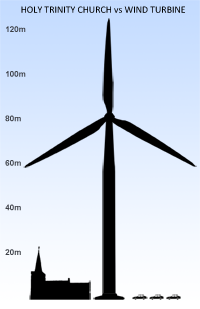- Home
- Proposals
- The Arguments
- About Us
- News
- BBC bias on climate change
- Latest News
- Climate change balance lost by BBC
- Energy Prices-The Times
- Turbines trash landscape benefit billionaires
- Global Warming Panic Over!
- Mini-Nukes the future
- The dirty secret of Britain's power madness
- Extreme weather the new Global Warming
- Tax Payers Alliance Energy view
- Britain can't afford wind power
- Fracking = prosperity?
- Its time to drill- Times leader
- Thoughtful article on Fracking
- Wind double subsidised
- Deluded energy policy
- The EU U-turn over energy
- Windfarm Wars Company in Churchover
- New noise guidance increases risk of harm
- Peter Lilley MP, Delingpole's new hero
- Shale Gas update 2013
- Maggie U-turned on Global Warming
- Devastatingly sad news
- 'smart' energy technology
- Engineers surveyed 2011
- Lord Turnbull speaks out
- Miracle shale gas
- Planning application refused!
- Warwickshire heritage beauty spot protected!
- Press
- Articles
- Letters
- How To Help
- Donations
- Letters of Objection
- New Churchover PC Objection
- New Historic England Objection
- Churchover Resident Objection
- CPRE Objection
- English Heritage Objection
- Objection by expert R&F historian
- Leicestershire County Council objection
- Warwicks CC Ecology objection
- Harborough District Objection
- Churchover PC Objection
- Bitteswell PC Objection
- Pailton PC objection
- Some other Objections sent
- Rugby BC Planning Committee
- Contact Us
Fuel poverty increases
Sunday Express December 5 2010
BRITAIN IS FREEZING TO DEATH
by Tracey Boles and Lucy Johnston
(emphasis added)
MIDDLE class families are among millions of Britons who cannot afford to heat their homes this winter, as elderly ride on buses all day to stay in the warm.
After a week of snow and freezing temperatures a shocking picture has emerged of the bleak months ahead for 5.5 million households. Pensioners, who are among those most vulnerable to the cold, are resorting to extraordinary measures to keep warm. Many have been using their free travel passes to spend the day riding on buses while others are seeking refuge from the cold in libraries and shopping centres.
Dot Gibson, spokeswoman for pressure group the National Pensioners’ Convention, said: “Now that we have one of the coldest winters, older people are going to have to make the unenviable decision whether or not to put the heating on. The Government should guarantee that they won’t cut the winter fuel allowance.”
The death toll from the big freeze rose to seven yesterday. They included two men who were killed in a crash on the M62 in Humberside and two teenage girls who died when their car collided with a Royal Mail van in Cumbria.
The winter death toll is set to rise steeply as official figures show that nine elderly people died every hour because of cold-related illnesses last year. The number of deaths linked to cold over the four months of last winter reached nearly 28,000.
Charities claim this country has the highest winter death rate in northern Europe, worse than colder nations such as Finland and Sweden. About half of the people forced to spend over 10 per cent of their income on energy bills – the official definition of fuel poverty – are aged over 60.
But working families also face a tough time meeting the cost of keeping the central heating turned on as fuel prices continue to rise.
Ann Robinson, director of consumer policy at price comparison service uswitch.com, said: “Middle-class households are now in fuel poverty.” National Energy Action estimates that 5.5 million households will have plunged into fuel poverty by early next year due to price rises.
This is up 400,000 on the group’s last estimate and represents 21 per cent of the UK’s 26 million households. The last official figures, for 2008, showed there were 4.5 million fuel-poor households in the UK. On Friday, British Gas will raise prices for eight million customers. Millions more customers of Scottish & Southern Energy and ScottishPower have already been hit by price rises.
Last winter 70 per cent of household were forced to cut down or ration their energy use because of cost.
Uswitch’s Ms Robinson, who advised Tony Blair’s government on energy policy, warned: “Winter price hikes will simply force even more people down this route.”
Energy minister Greg Barker admitted last week that the system to deal with fuel poverty was “completely broken” and said he was “very worried” by the NEA figures.
Charity Age UK estimates that nearly a third of pensioners have resorted to extreme measures to keep warm. The National Pensioners’ Convention has described the situation as “Dickensian”.
Widow Rita Young, from Thorny, near Peterborough was struggling to stay warm last week. Mrs Young, 75, said: “I’ve worked all my life. It doesn’t feel fair. People my age don’t want to put hats and scarves on in their homes, but there’s nothing we can do about it. I sit in a blanket put on a hat and sometimes go to bed at 7.30 in the evening.”
Last week Lillian Jenkinson, 80, and William Wilson, 84, were found dead in the gardens of their homes 70 miles apart in Cumbria. Both are thought to have lain undetected in sub-zero temperatures for hours.
On Thursday a driver who stopped to help a stranded motorist in the Yorkshire Dales was killed when he was struck by another vehicle.
ASWAR suggests that the policy of subsidising windfarms will only increase fuel poverty.

